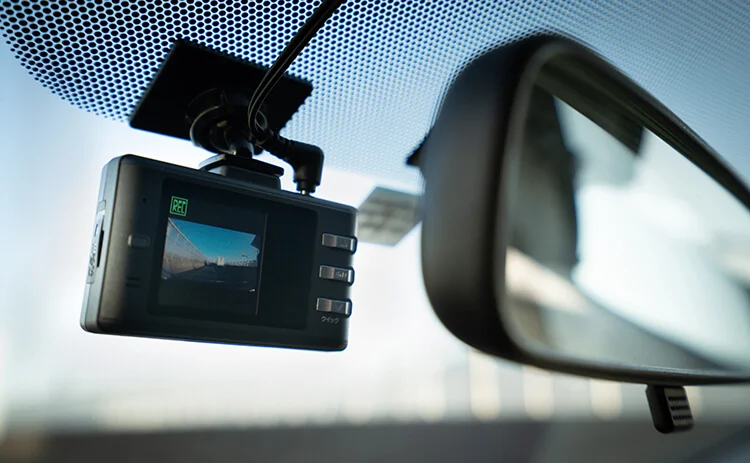Dash cams, or dashboard cameras, offer drivers a valuable layer of protection. They continuously record footage of your vehicle’s surroundings, serving as an impartial observer in the event of accidents, traffic disputes, or unexpected events. As dash cams become increasingly popular, the state of Washington has defined specific regulations regarding their use and installation. This article explores crucial aspects of dash cam laws in Washington to ensure you stay informed and compliant.
Are Dash Cams Legal in Washington State?
Yes, dash cams are legal in Washington State. However, there are specific restrictions, particularly regarding where you can mount them, to ensure clear driver visibility.
Windshield Mounting Restrictions
Washington State law prohibits mounting any objects that obstruct the driver’s view of the road. To avoid hindering visibility, you cannot mount your dash cam on the windshield. The most suitable location is on your dashboard, where it won’t block your line of sight.
- Specific Restrictions: Revised Code of Washington (RCW) 46.37.410 clarifies that non-transparent objects or materials cannot be placed on the windshield in a way that materially obstructs a driver’s clear view. There are limits to the space these devices can occupy, specifically:
- Driver’s side: Maximum five-inch square
- Passenger’s side: Maximum seven-inch square
Audio Recording Considerations
If your dash cam records audio as well as video, there are additional privacy considerations in Washington State. The state is a “two-party consent” state, implying that you must obtain consent from everyone in your vehicle before recording their conversations.
- Informing Passengers: It’s recommended to inform passengers, including employees or customers, of the presence of a dash cam with audio recording capabilities. A visible sticker or sign is an effective way to provide notice.
Benefits of Using Dash Cams
Dash cams provide several advantages for drivers in Washington State:
- Evidence in Accident Disputes: Dash cam footage serves as indisputable evidence of what transpired during an accident, assisting in clarifying fault and streamlining insurance claims.
- Protection Against Fraud: Dash cams can discourage fraudulent claims and staged accidents.
- Driving Behavior Monitoring: Fleet managers and parents of young drivers can use dash cams to monitor driving habits and promote safe practices.
- Capturing Scenic Routes: Dash cams capture the breathtaking scenery of Washington’s diverse landscapes, allowing you to preserve travel memories.
Insurance Discounts and Dash Cams
While not all insurance providers in Washington State offer explicit discounts for dash cam users, they might consider dash cam footage as favorable evidence. This can potentially have a positive impact on your insurance premiums over time, especially if it helps establish your safe driving record. Contact your insurance company to inquire about potential programs or benefits related to dash cam use.
Protecting Your Privacy with Dash Cam Footage
Remember that dash cam footage contains personal information. Take measures to safeguard this data and manage it responsibly:
- Secure Storage: Store your dash cam footage securely, ideally using password protection or encryption, particularly if it contains audio recordings.
- Selective Sharing: Exercise caution when sharing dash cam footage, especially online on social media platforms. Blurring license plates and faces of bystanders can help protect their privacy.
- Data Retention: It’s not necessary to keep dash cam footage indefinitely. Delete old footage regularly to minimize the risk of data breaches.
Additional Considerations
- Commercial Vehicles: Washington State may have additional regulations regarding dash cams for commercial vehicles. Consult with your fleet manager or relevant authorities.
- Technology Advancements: Stay updated on dash cam technology advancements. Newer models might offer features like cloud storage, making data management easier.
- Local Ordinances: Some cities or counties in Washington might have specific ordinances about dash cam use. Research any regulations in your area.
Conclusion
Dash cams offer a range of benefits for Washington State drivers, making them a valuable investment for security and peace of mind. By being mindful of dash cam regulations, including windshield mounting restrictions and audio recording considerations, you can harness their advantages while operating your vehicle responsibly and legally.
Sources
- Revised Code of Washington (RCW) 46.37.410 (Windshield Obstructions): https://app.leg.wa.gov/RCW/default.aspx?cite=46.37.410
- Revised Code of Washington (RCW) 9.73.030 (Privacy): https://app.leg.wa.gov/RCW/default.aspx?cite=9.73.030
- Elsner Law Firm – Are Dash Cameras Legal in Washington State?: https://elsnerlawfirm.com/are-dash-cameras-legal-in-washington-state/
- Colburn Law – Washington State Dash Cam Laws: https://www.colburnlaw.com/washington-state-dash-cam-laws/
- Will & Will – Can Dash Cam Evidence Be Used in Civil Court? Washington State: https://willdefendwa.com/dash-cam-evidence-in-court/
Additional Tips
- Quality Matters: Invest in a dash cam with a high-resolution camera to ensure clear footage capture, essential for evidence purposes.
- Loop Recording: Look for a dash cam with loop recording functionality, which automatically overwrites old footage when the memory card is full.
- Parking Mode: Several dash cams offer parking mode for surveillance while your vehicle is left unattended.
- Installation: If you’re not confident, consider getting your dash cam professionally installed to guarantee correct placement and wiring.
Disclaimer: This article is intended to offer general information regarding dash cam regulations in Washington State. It does not constitute legal advice. It’s advisable to consult with an attorney if you have specific legal questions or concerns.



